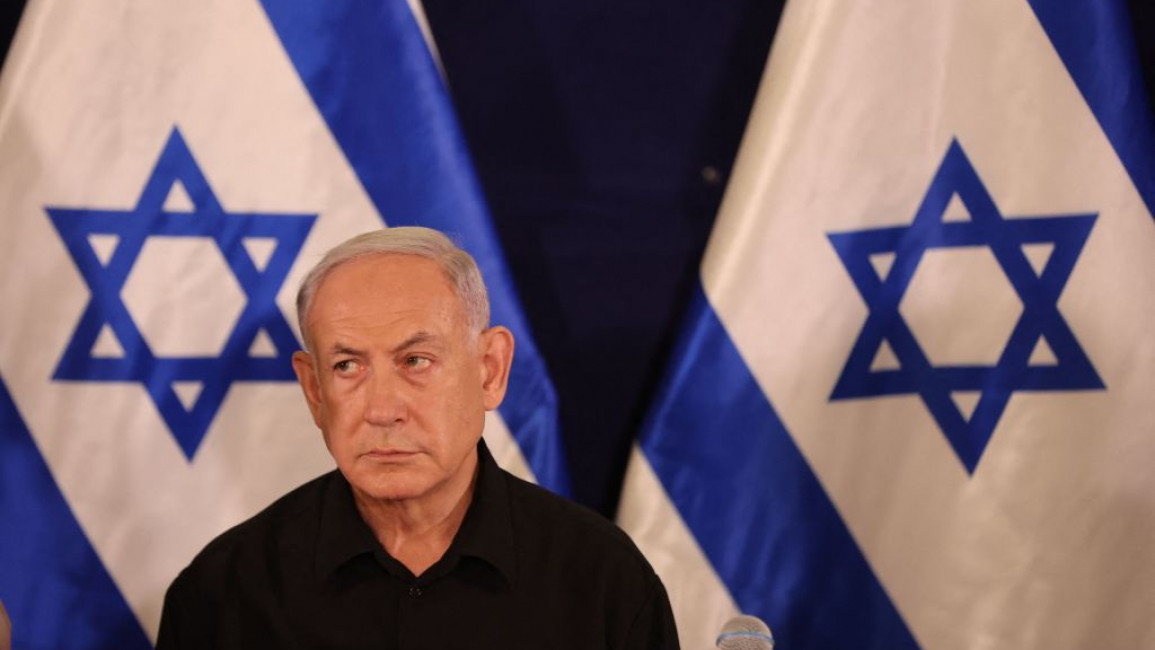
The end of 'Mr. Security': How Netanyahu's self-styled image has been shattered

Benjamin Netanyahu has for decades sought to cultivate and promote his self-styled image and persona as a straight-talking, no-nonsense leader unwavering in his dedication to safeguarding Israel’s security, no matter how unpopular it often made him.
The 7 October Hamas attack on southern Israel has undoubtedly shattered this image and exposed how hollow it was to begin with.
The embattled Israeli prime minister has sought to deflect all blame. In a Sunday post on X, which he promptly removed following a predictable backlash, Netanyahu tried to place the blame on his intelligence chiefs for the deadliest attack in Israel’s modern history.
While heads of the army and Shin Bet domestic intelligence service, even the finance minister, have acknowledged their failures, Netanyahu himself has not.
The closest Netanyahu has come to taking responsibility was a 25 October statement in which he said, “Everyone will have to give answers on the debacle – including myself – but all that will happen only after the war”.
"The 7 October Hamas attack on southern Israel has undoubtedly shattered this image of 'Mr. Security' and exposed how hollow it was to begin with"
It’s not inconceivable that Netanyahu could hold on to power as head of the current emergency unity government and avoid possible jail time on corruption charges so long as this war lasts.
And it could last months, especially if there is a large-scale ground war in Gaza, which will undoubtedly prove highly costly and destructive.
While the emergency government formed to oversee this war includes Benny Gantz, a retired army general widely respected and trusted by many Israelis, Netanyahu’s record demonstrates he is unfit to head a wartime government.
And while he has so far refused to accept any blame for 7 October, Netanyahu’s policies arguably played a significant role in creating the conditions that led to the perfect storm which enabled Hamas to mount such a deadly and previously unthinkable attack.
The last time Israel launched a ground incursion into Gaza targeting Hamas tunnels, in mid-2014, Netanyahu derided the Obama administration, telling it “not to ever second-guess me again” on how to deal with Hamas.
This is the same leader who ultimately settled for containment and launching occasional operations in Gaza, controversially summed up with the phrase “mowing the lawn,” which was, especially in retrospect, of questionable overall strategic value.
Analysts have also pointed to the “violent equilibrium” that Netanyahu had maintained with Hamas to keep Gaza and the West Bank separated while undermining the Palestinian Authority and any chance of Palestinian statehood.
“Hamas was actually a good partner for Israel in the sense that it was able to stabilize the Gaza Strip and it provided the perfect fig leaf for the Israelis to justify their blockade,” Tareq Baconi, president of the board of Al-Shabaka: The Palestinian Policy Network, recently told the New Yorker.
“Israel thought it could contain Hamas in the Gaza Strip and allow it to stabilize the area, and then it was out of sight, out of mind”.
This policy was upheld during his lengthy premiership, the longest in Israel’s history, all the while offering the Palestinians nothing more than what he called a “state-minus”, which would include total Israeli security control over the occupied West Bank, settlements remaining in place, and no capital in East Jerusalem.
|
|
The first Israel-Hamas war Netanyahu oversaw as prime minister was the relatively brief eight-day Pillar of Defence operation in November 2012. Israel relied on artillery and airstrikes to target Hamas, while Hamas demonstrated it had rockets that could reach Tel Aviv for the first time.
In recent years, Netanyahu also seemed to have bought into the idea that Hamas was content with not fighting Israel again anytime soon since the blockade was being relaxed slightly, with some Gazans even receiving permits to work in Israel and bring much-needed cash back home to the beleaguered strip.
Furthermore, some took comfort in the belief that the 2021 war had deterred Hamas from risking another costly round, which was seemingly reinforced by the 2022 Gaza war when Israel briefly fought Islamic Jihad in Gaza and Hamas did not intervene.
Such assumptions, which saw intelligence of Hamas actively practising for a raid against Israel overlooked, proved false and lulled Israel into a false sense of security as the group prepared for what amounted to arguably the most devastating single attack, especially for civilians, in its history.
"Analysts have pointed to the 'violent equilibrium' that Netanyahu had maintained with Hamas to keep Gaza and the West Bank separated while undermining the Palestinian Authority and any chance of Palestinian statehood"
An in-depth profile of Netanyahu published in September recounts how, had it not been for the death of his older brother Yonatan in the daring Israeli hostage rescue mission in Entebbe, Uganda, he may not have ever lived in Israel again. The family founded a think-tank on terrorism named in Yonatan’s honour. It jumpstarted Netanyahu’s political career.
Twice as many Israelis have been kidnapped directly from their homes by Hamas than were taken hostage on the hijacked plane that flew to Entebbe in 1976. And the families of those hostages in Gaza feel utterly abandoned and neglected by their government.
In the 1980s, Netanyahu advocated a firm stance for dealing with what he deemed terrorist organisations, invariably arguing that any negotiations with such groups should be rejected out of hand since it would only embolden them.
As prime minister, he oversaw in 2011 the release of over 1,000 Palestinian prisoners in return for a single Israeli soldier, Gilad Shalit, held in Hamas captivity. While that decision obviously contradicted his stated beliefs decades earlier, the move was supported by many Israelis and was a unique case.
In the 1991 Persian Gulf War, Netanyahu appeared on CNN wearing a gas mask as Saddam Hussein’s Iraq fired Scud missiles at Israel. His penchant for using maps to contrast Israel’s small size compared to Arab countries and other props and visual aids originated around this time.
In 2012, at the United Nations, he used a cartoon bomb to warn about Iran’s uranium enrichment. This year, he held up a map showing how the Middle East could be fundamentally transformed if Israel and Saudi Arabia normalised relations. The map conspicuously did not include the occupied Palestinian territories.
His cheerleading of President Donald Trump unilaterally withdrawing the United States from the 2015 Iran nuclear deal in 2018 with no comprehensive Plan B has resulted in Tehran getting closer than ever to being able to assemble a nuclear weapon in short order.
Similarly, his attempts to circumvent the question of ending Israel’s military occupation while pursuing a peace deal with Saudi Arabia have clearly failed. US President Joe Biden, a staunch Israel supporter, is now calling for a two-state solution after this war.
It’s also worth bearing in mind that one purported reason the United Arab Emirates (UAE) agreed to normalise relations with Israel under the US-sponsored 2020 Abraham Accords, heralded by Netanyahu as “a new dawn of peace” in the region, was to prevent the slated annexation of the occupied West Bank.
|
|
That reality, and the demands made by Saudi Arabia as part of any normalisation deal, underscores how it’s almost impossible to separate Palestine from normalising ties with Arab states, contrary to what Netanyahu and his supporters would have liked to believe.
By some accounts, and despite a subsequent policy of containment, Netanyahu was also relatively late to recognise the growing power of Hamas and similar groups.
A review of his 1993 book, 'A Place Among Nations', said he gave an “astonishingly dated” political analysis of the situation in the Middle East, barely mentioning Hamas while viewing the Palestine Liberation Organisation (PLO) as the major threat. Netanyahu was an outspoken critic of the Oslo Accords and during his first stint as prime minister in 1996 worked actively to undermine them.
He also failed to address serious domestic problems in his book, overlooking the growing religious-secular divide.
This year, Netanyahu fatally undermined Israel’s social contract and widened this divide when he pushed for a law permanently exempting ultra-orthodox citizens from mandatory military service under the pretext of judicial reforms.
"Netanyahu's attempts to subvert the Supreme Court and circumvent the occupation of Palestinian territory both ended in disaster. He put his political survival ahead of the welfare of the country"
He did so as part of a coalition deal with the ultra-orthodox parties in his government so he could stay in power and out of jail. The move sparked widespread protests in Israel and an unprecedented number of military personnel refused to serve in protest. There were even fears of civil war.
Netanyahu’s attempts to subvert the Supreme Court and circumvent the occupation of Palestinian territory both ended in disaster. He put his political survival ahead of the welfare of the country.
And when Hamas, which he explicitly told the Obama administration never to “second guess” him on, swept across southern Israel and massacred 1,400 people, most of them civilians, he was powerless to do anything for days. His wife Sara even reportedly attempted to prevent the establishment of the emergency government.
When Netanyahu finally met soldiers days into the crisis, his flak jacket and sullen expression hardly boosted anyone’s morale. Naftali Bennett, a political rival of Netanyahu’s who briefly served as prime minister in 2021 and a self-made millionaire, undoubtedly inspired much more confidence when he showed up to serve with the other reservists (Netanyahu’s son Yair, conversely, remains in Miami, something which angers many on-duty reservists).
And a large number of Israelis have had to relocate from the border regions, including in the north near the Lebanon border since the state can no longer ensure their security. How even Netanyahu’s most ardent supporters could give his self-serving image as Mr. Security any credence whatsoever after 7 October and his indecisiveness since is hard to fathom.
2023 will undoubtedly go down as a critical year in Israel’s modern history. As for Netanyahu, this year, more than any other, unequivocally demonstrated how unfit he is to lead the country in either peacetime or war.
With over half of Israelis wanting Netanyahu to resign, and political rivals wanting him out, his long fight for political survival is likely coming to an end.
Paul Iddon is a freelance journalist based in Erbil, Iraqi Kurdistan, who writes about Middle East affairs.
Follow him on Twitter: @pauliddon




